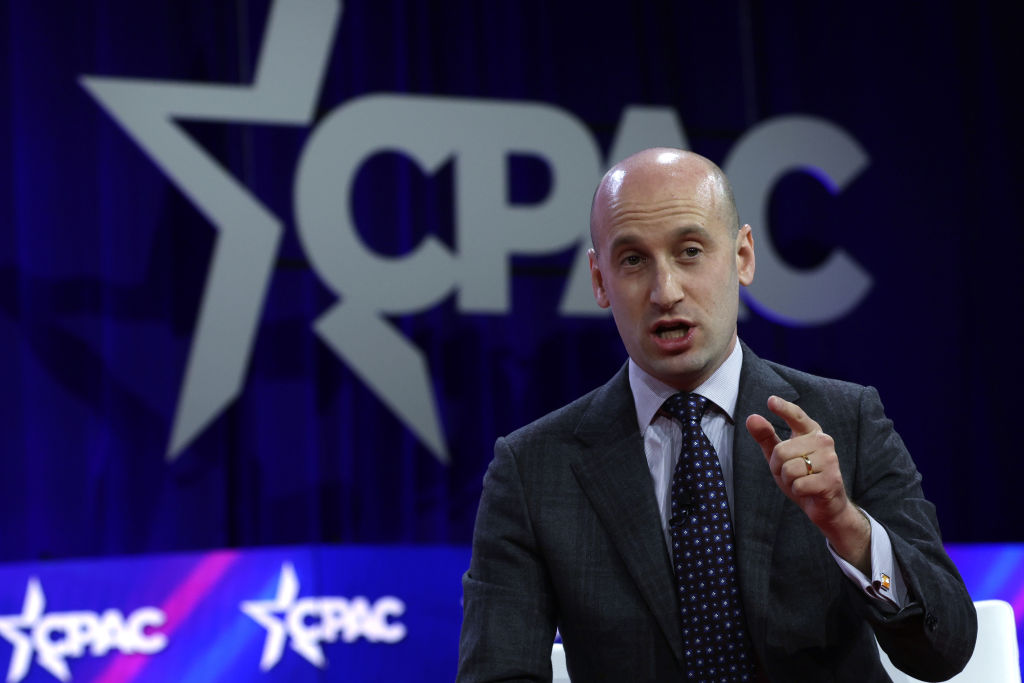The campaign for the Republican nomination is down to two candidates, and Nikki Haley has gone on the offensive against Donald Trump since her second-place finish in the New Hampshire primary last month. Her critique of Trump’s proposal to increase tariffs prompted a response from Trump adviser Stephen Miller claiming that tariffs are paid for by foreign producers and that the U.S. can restore American jobs by restoring tariffs. His first claim is false. His second claim is misleading because, while tariffs may help preserve jobs in some industries, research shows they also threaten jobs in other sectors.
Last year, the Washington Post reported that Trump and his top advisers had discussed the prospect of implementing a “universal baseline tariff” on most imports into the country if he were reelected. Such a tariff would be a substantial escalation of the already controversial tariff policies and accompanying trade war during Trump’s first term. In a January 29 appearance on CNBC, Haley criticized the proposal, claiming Trump wanted to “put 10 percent tariffs across the board, raising taxes on every single American.”
Miller responded, via a tweet, that tariffs are actually a tax on foreign producers, not domestic ones, and that a lack of adequate tariffs caused the collapse of South Carolina’s manufacturing towns.
Miller’s claims ignore the negative impacts of tariffs on domestic consumers, however, and overstate the efficacy of protectionism on preserving industry in South Carolina.
Miller’s first claim, that tariffs are a tax only on foreign producers, is incorrect. Tariffs—which are taxes imposed on goods and services imported from other countries—are paid directly by U.S. businesses that purchase from abroad. While the added costs of these tariffs are theoretically distributed among the buyer, seller, and consumer, economic research into U.S. tariffs has found that almost all of this added cost is passed onto domestic producers and consumers.
“For most, if not almost all commodities, when a tariff is placed on imports of the commodity (for example, steel or refrigerators) the price for the commodity paid by consumers goes up, not always by the full amount of the tariff, but usually by most of the amount of the tariff,” Vincent Smith, economist and director of Agricultural Policy Studies at the American Enterprise Institute, told The Dispatch Fact Check. “Domestic producers facing import competition then benefit from those higher prices but all consumers in the country bear a cost.”
American consumers experienced this cost as a result of Trump’s 2018 tariffs. Research from economists at the University of Chicago’s Becker Friedman Institute found that the price of washing machines and dryers rose nearly 12 percent after import tariffs were imposed. “It was no accident that once the Trump administration imposed tariffs on imports of kitchen appliances and washers and dryers, the prices of those commodities in stores like Lowes and Home Depot jumped by between $50 and $100 for appliances of modest quality, and more for higher end appliances,” Smith explained.
But, how did tariffs impact South Carolina’s manufacturing towns? Miller also claimed in his tweet that “ripping down tariffs are how globalist elites gutted manufacturing towns in South Carolina,” and that “restoring tariffs are how we bring those jobs back.” While it is difficult to determine the precise impact of tariffs on South Carolina’s manufacturing industry, the state saw significant declines in its once thriving textile towns—while experiencing impressive gains in other industries—despite the presence of strict protectionist policies.
It is true that South Carolina’s once thriving textiles manufacturing industry has nearly collapsed. This decline began in the 1970s, as it did for many developed economies: Domestic textile manufacturers struggled to compete with low-cost imports from developing countries.
In response to pressure from foreign competition, the World Trade Organization (WTO) implemented the Multifibre Arrangement in 1974, which, according to the WTO, “established quotas limiting imports into countries whose domestic industries were facing serious damage from rapidly increasing imports.” Despite these protectionist policies, South Carolina’s textiles industry still faced rapid decline. “Newberry Mills, South Carolina’s fifth oldest operating cotton mill, will be the state’s 12th textile mill to close in seven months as South Carolina’s largest industry declines,” the New York Times reported in a 1982 story about the closing of textile mills in southern states. “More than 18,000 of 133,000 textile employees are out of work, and officials say they fear that as many as 4,000 jobs will be permanently lost,” it added. A new system designed to slowly lift quotas over the following decade—the Agreement on Textiles and Clothing—took effect in 1995, after much of the industry’s collapse had already occurred.
South Carolina lost many jobs in the textiles manufacturing industry during the turn of the millennium, however it has also seen significant growth in other manufacturing and service industries. Greenville, South Carolina—a once bustling textile town—is now an innovative center for technology and startups, and foreign companies such as BMW and Michelin have established significant manufacturing presences in the state. A 2018 study by the University of South Carolina found that BMW’s plant in Greer alone supported nearly 104,000 jobs across the country.
“We can debate what happened to South Carolina manufacturing in the late 20th century. But the fact of the matter is that today’s South Carolina economy relies heavily on international trade,” Bill Hauk, a professor of economics at the University of South Carolina told The Dispatch Fact Check. “Higher tariffs will not help an economy where the largest private employers are foreign multinationals that produce goods sold around the world.”
In fact, in 2018, South Carolina’s largest business group, the South Carolina Chamber of Commerce, actively fought against Trump’s proposed tariffs and encouraged the state’s congressional delegation to oppose it, fearing that a trade war could lead many of the foreign companies with substantial footprints in the Palmetto State—such as BMW—to move more of their manufacturing back overseas. According to the New York Times, the German automobile manufacturer increased its production capacities in China and ceased some exports from its Spartanburg, South Carolina, plant as trade tensions rose during the Trump presidency.
“At the end of the day, a tariff is simply a tax. And in this case, it is a tax that is likely to increase the final sales price of vehicles produced in South Carolina,” Joseph Von Nessen, a research economist at the University of South Carolina, said in a 2019 economic report about the effect of tariffs on the automotive industry. “This price increase, in turn, can have a negative impact on the demand for these vehicles.”
If you have a claim you would like to see us fact check, please send us an email at factcheck@thedispatch.com. If you would like to suggest a correction to this piece or any other Dispatch article, please email corrections@thedispatch.com.







Please note that we at The Dispatch hold ourselves, our work, and our commenters to a higher standard than other places on the internet. We welcome comments that foster genuine debate or discussion—including comments critical of us or our work—but responses that include ad hominem attacks on fellow Dispatch members or are intended to stoke fear and anger may be moderated.
With your membership, you only have the ability to comment on The Morning Dispatch articles. Consider upgrading to join the conversation everywhere.